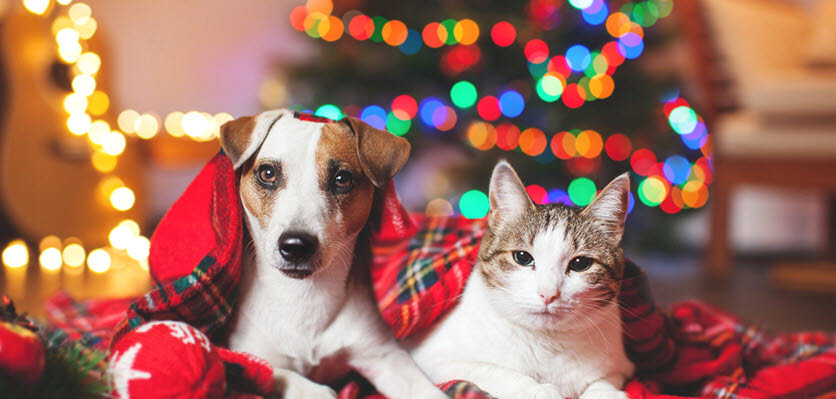
It can be a lot of fun to include your beloved pet in Christmas festivities. However, it’s important to be aware of a few seasonal hazards which can be common reasons for not-so-jolly vet visits.
Choke hazards and intestinal foreign bodies
It can be tempting to give your pet a tasty left-over Christmas roast bone to gnaw on. However, cooked bones should never be given to pets as they can splinter into shards which can seriously damage the mouth, throat or intestines.
For this reason, it’s important to ensure that your pet can’t access the rubbish bin for unplanned Christmas leftovers! This is a common cause of post-Christmas vet visits.
Also, whilst many cats and dogs will enjoy playing with left-over present wrapping paper, take care to remove any string, metal or plastic decorations first, as these can cause dangerous gut obstructions if swallowed. Care must also be taken to ensure that they do not swallow the paper!
Toxic foods for pets
While it’s natural to want to share your Christmas feast with your pet, take care to avoid the following foods, which can be toxic or dangerous to pets:
- Turkey stuffing (or any food containing onion or garlic)
- Christmas pudding or mince pies containing sultanas or raisins
- Christmas ham - the high-fat content can trigger pancreatitis
- Smoked salmon - the high salt content can be dangerous for pets with high blood pressure, heart disease, or kidney disease
- Chocolate, cacao or coffee - these are toxic to pets
- Grapes - these are toxic to some pets
- Cooked bones - can cause obstruction and gut damage risk as outlined above
If you wish to give your pet some safe Christmas food, it’s generally ok to give them small amounts of freshly-cooked white turkey meat, boneless salmon fillet, shelled and gutted prawns, or plain-cooked vegetables such as potato, pumpkin, carrots and peas.
Anxiety in pets
If your pet is bothered by loud noises or crowds of people and you’re planning to host a Christmas gathering, it’s best to confine your pet to a quiet area of the house where they can relax for a few hours. Pick somewhere cool and well-ventilated. Take dogs for a walk prior to guest arrival, so they can expend excess energy and have a good opportunity to toilet prior.
Ensure your pet has their favourite bedding and any comfort toys with them, as well as free access to water (and a litter tray for cats). Consider the use of calming scent hormones such as Feliway for cats or Adaptil for dogs. If your pet normally enjoys certain safe chew toys or puzzle treats, provide them with their favourite type for some mental stimulation.
If your pet is known to get very anxious in these kinds of situations, it’s best to book an appointment with your veterinarian at least several days prior to discuss the use of safe, temporary anti-anxiety medication for your pet.
